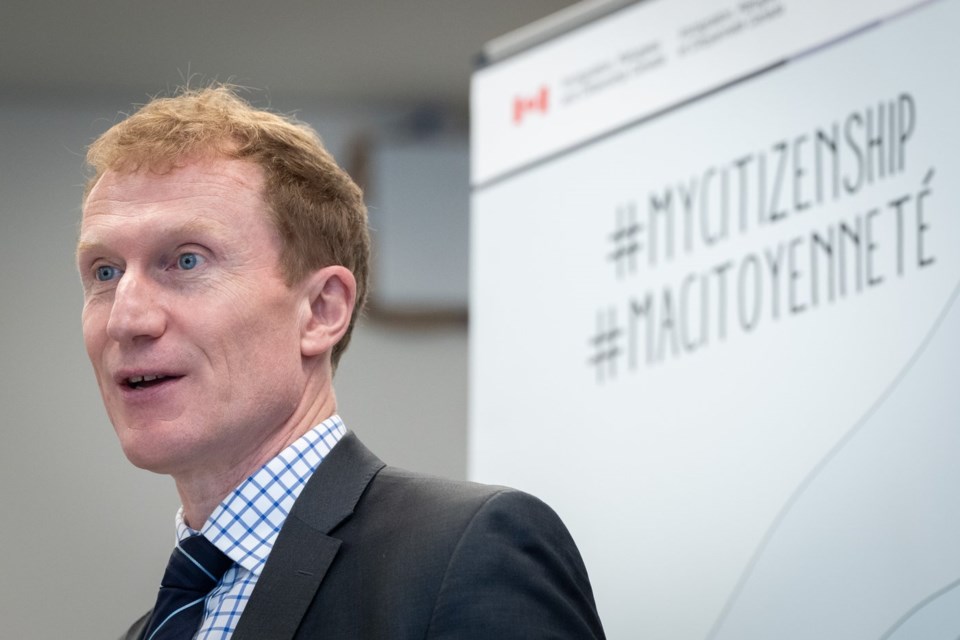OTTAWA ŌĆö A new government bill tabled in the House of Commons on Thursday would allow Canadians to pass citizenship rights down to their children born outside the country ŌĆö a move that would add an unknown number of new citizens.
In 2009, former Conservative prime minister Stephen Harper's government changed the law so that Canadian parents who were born abroad could not pass down their citizenship, unless their child was born in sa╣·╝╩┤½├Į.
Those who have not had access to citizenship rights as a result of the amendments are known as "Lost Canadians."
The new bill looks to undo that change, which was struck down by a recent court challenge, and extend citizenship by descent beyond the first generation born outside of sa╣·╝╩┤½├Į.
The legislation would automatically confer citizenship rights to children born since 2009 who were affected by the Conservatives' changes.
It would also create a new test for children born after the legislation comes into force.
Parents who were born outside of sa╣·╝╩┤½├Į will need to have spent at least three years in sa╣·╝╩┤½├Į before the birth or adoption of their child to pass on their Canadian citizenship.
The government has no idea how many people will be automatically granted citizenship if the legislation is passed.
"We're a country that supports human rights, equality and respect for all people," Immigration Minister Marc Miller said in the foyer outside the House of Commons after he tabled the bill.
"There's no doubt that Canadian citizenship is highly valued and recognized around the world. We want a citizenship to be fair, accessible, with clear and transparent rules."
Last year, the Ontario Superior Court found the current system unconstitutionally creates two classes of Canadians, and gave Ottawa until June 19 to fix the problem.
"This is an example of Conservatives having taken away Canadians' rights and something they hold most dear to them, in their citizenship," Miller said.
The implications of the change made in 2009 were hugely significant for families, NDP immigration critic Jenny Kwan said. She helped to draft the new legislation alongside the Liberals.
"I've talked to family members who have been separated from their loved ones because of this unjust law that Conservatives brought in 15 years ago," she said.
"I've talked to family members where their children are deemed stateless, lost in the system, because of this unjust, punitive, unconstitutional law that the Conservatives brought in."
The government may have to request an extension from the court while the bill makes its way through the House of Commons, Miller said, but he doesn't want to wait long to fix the issue because people are being prejudiced in the meantime.
Kathryn Burton, who was born in the U.S. to a Canadian mother and who is a member of Gesgapegiag Mi'kmaq First Nation in Quebec, was unable to pass her citizenship onto her children, despite them also having First Nations status.
She said she brought the issue to Miller, calling it an "unintended consequence" of the law, and he immediately understood what she was talking about.
"My mom always said, 'Never let the federal government define you,'" she said at the news conference Thursday, celebrating the bill's introduction. "But when they do, we forcefully and respectfully push back."
With her sons standing steps away from her, she said she can't wait for them to stand up at a citizenship ceremony and be seen as proud and rightful citizens.
"My son just said, 'Please don't cry.' But it is truly a moment for my family," she said.
It's not the first time federal politicians have attempted to fix the issue.
A private member's bill from Conservative Sen. Yonah Martin sought to reinstate another category of "Lost Canadians," who were stripped of their citizenship because of legislative change in 1977.
The bill made it nearly all the way through the legislative process, but when it was taken up by the House of Commons immigration committee in late 2022, the Liberals and NDP introduced wide-ranging amendments to grant citizenship to even more people.
The Conservatives said the changes would materially affect the Citizenship Act without appropriate study or due diligence.
Despite moving back to the House after the committee process, the bill has not been brought back out by the Conservatives for third reading.
In a statement on Thursday, Conservative MP Tom Kmiec, who serves as his party's critic of immigration, refugees and citizenship, said sa╣·╝╩┤½├Į's immigration system is "falling apart."
"Common sense Conservatives will fix our immigration system that the Liberals have broken," the statement reads.
"Justin Trudeau and his NDP coalition partners control the majority of seats in Parliament and have the power to block or pass what they want."
This report by The Canadian Press was first published May 23, 2024.
ŌĆö With files from Laura Osman.
Alessia Passafiume, The Canadian Press


